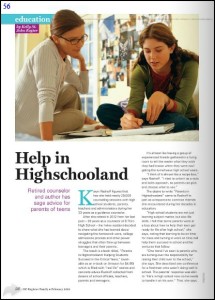
Bad Teacher: Here’s Your Road Map for Dealing with Difficult Teachers
BY KELLY ST. JOHN REGIER
July 21 – 2015 2:25 PM
Contributing writer
OC Family
[Click here to read/print a PDF file version of this article.]
This is not a story about teachers who are sex offenders, or selling drugs or hitting children. This is a story about teachers who walk a complicated line. They may speak to their students in a harsh tone, or read grades aloud to shame the underachievers, or play favorites in a way that’s difficult to pin down. They are not breaking the law or even school rules, but they are making your child miserable.
Most teachers are good people. They are hard working, compassionate men and women who care deeply about learning and about the children they teach. But there are a few bad apples, and most parents will have to deal with a problematic teacher during their child’s school career. When your kid lands in the classroom of a bad teacher, how should you handle it?
What should a parent do if her child comes home complaining that a teacher doesn’t like him, or if she suddenly stops wanting to attend school? How can you unravel whether it’s the teacher, your kid or something else that’s the problem? And what should you do about the situation?
Stay Calm and Investigate
“Collect information,” advises Karyn Rashoff, a counselor at El Toro High School in Lake Forest for more than 20 years and now an author. “Most teachers have websites. Read them to learn classroom expectations and whether your child has missed any assignments.”
Speak with your child about his or her concerns, and try to get specific details.
If you’re worried that a teacher used degrading or inappropriate language, “Get the quote,” says Rashoff. “Ask, ‘Exactly, what did he say?’ ”
Keep questions somewhat casual, so your child doesn’t exaggerate or clam up. A kindergartner might say a teacher is “mean” because she makes him stay in his seat or do his work, so it might simply be a case of explaining to your child the normal expectations at school. If you do start to hear things that concern you, try to keep your emotions in check as you decide what to do next. That’s not always easy for parents.
If you do think there is a problem, let your child know that you want to work with the teacher to make sure school is a positive experience.
“If the parent is not happy with what he or she perceives is going on with the school, I would always encourage parents to say something,” says Leslie Coghlan, director of Pupil Services for the Anaheim City School District.
“We know that children who are happy to be going to school have higher success rates,” adds Yesenia Navarro, Curriculum Specialist for parent involvement for the Anaheim City School District.
Go to the Teacher
“One thing you never want to do is blindside a teacher,” says Maureen Christensen, president of the Fourth District Parent Teacher Association, which represents all of the PTA councils in Orange County.
Until you talk with the teacher, you do not have the full picture of what is happening in the classroom, just your child’s perception of it. So don’t request a meeting with the school principal or school board without talking to the teacher first. If you feel an issue needs to be raised, make an appointment with the teacher.
Try to be diplomatic, and use non-blaming language. Say something like, “I’m wondering if you could help me understand what’s going on with Steve,” rather than, “Steve says you are mean.” Go into the meeting assuming the best of the teacher and your child, but be prepared to hear your child may have done something to annoy the teacher. Contrary to many parents’ assumptions, our little angels aren’t always perfect.
“Maybe it’s a case where your child hasn’t turned in four assignments. If you don’t do your work, you’re not going to be as respected as a kid who does his or her work,” Rashoff says. Ideally, the teacher will shed light on the situation and become your ally to make sure your child is in the best learning environment. If that’s not the case — or if the teacher becomes defensive — try to keep your calm and reiterate that you are just trying to learn as much as you can about the situation.
One practical tip from school experts: To schedule a meeting with a teacher, email is better than the phone, and it is reasonable to expect an answer within about 24 hours.
One more reminder: “It is best to establish connections with your children’s teachers before any problems arise”, says Marisol Cordova, a community liaison at Edison Elementary in Anaheim, who works daily as a link between parents and school officials. Many schools — especially ones with large populations of English-language learners — have community liaisons like Cordova, and they can be a valuable ally to help parents best advocate for their children.
“Make yourself present. Even if you work, email the teacher at the beginning of the year to introduce yourself and offer support. Stop by back-to-school night so they know who you are,” Cordova says. Christensen adds: “If you are in constant communication, then there shouldn’t be any surprises.”
Now, Reassess
Maybe your meeting with the teacher cleared up a little misunderstanding. Maybe you learned that your child’s teacher is a little grumpy or serious, which means you can help your child understand that just because someone doesn’t smile all the time, it doesn’t mean he or she doesn’t like him.
“It’s important for kids to learn how to deal with different personality types because they have to deal with them in the real world,” says Rashoff. But if you have raised concerns with the teacher on more than one occasion, and don’t feel you have gotten a good resolution, it’s time for a decision. Do you help your child make the best of the current situation — or go over the teacher’s head to complain to the principal?
Christensen says her son had a dour kindergarten teacher that he didn’t really like during his school career. She dealt with the problem by volunteering to help more in the classroom and reinforcing to her son that he was still learning in school even though his teacher didn’t seem like the warmest person.
“While principals want students to be in an environment where they can succeed, there is no ‘constitutional right’ to have the teacher you choose,” Rashoff says. “In middle and high schools in particular, sometimes a particular teacher is the only one who teaches a certain subject, so students have to adjust to different teaching styles.”
In that case, it is important to work with your teenager to make sure they don’t sabotage themselves. Rashoff recalls that her son didn’t like his AP European History teacher, so he stopped doing the work and his grade suffered for it.
“He was really punishing himself,” Rashoff says.
In the rare case a principal cannot resolve the issue, only then should parents consider contacting the district office to complain. The takeaway for parents is that they should really consider themselves a partner with their child’s teacher. That’s all the more true now that the new Local Control Funding Formula for schools specifically names parental involvement as one of eight priorities for districts, says Coughlan of the Anaheim City School District.
“Parent input is always valued and appreciated, and teachers want to know when they feel their child is being challenged too much, or not enough,” says Coughlan. “They know their child best.”

